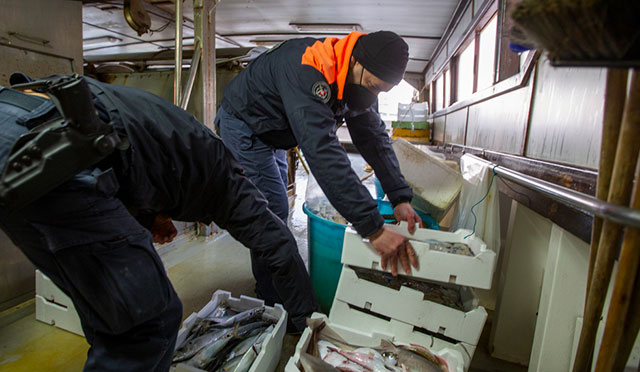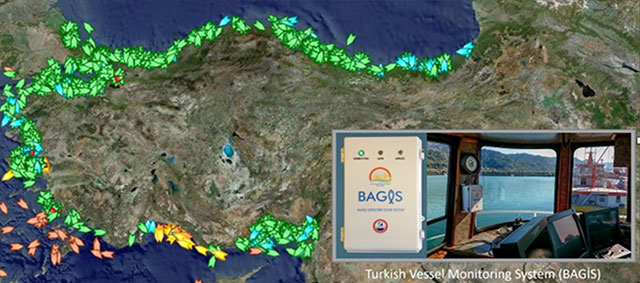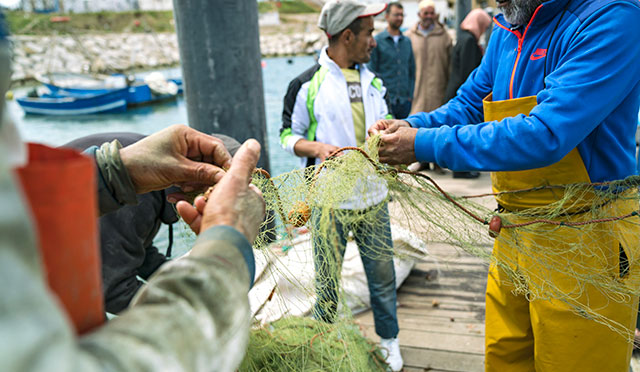Strengthening collective efforts to eradicate IUU fishing and ensure compliance

The General Fisheries Commission for the Mediterranean (GFCM) is gearing up to effectively curb illegal, unreported and unregulated (IUU) fishing in the Mediterranean and the Black Sea. Countries are working collectively to establish and implement all necessary measures to protect the well-being of our seas and the livelihoods of coastal communities. The GFCM actively supports these efforts, ensuring compliance with regulations in place.
In 2017, the GFCM adopted a Regional Plan of Action to Combat IUU Fishing (RPOA-IUU), offering guidance to GFCM members on how to combat IUU fishing through national plans while working to harmonize relevant measures across the region. The GFCM-Lex platform, a multilingual online repository of national fisheries legislation, provides a strong foundation for a united approach to regulation in the fight against IUU fishing.
 © Ministry of Agriculture and Rural Development, Albania
© Ministry of Agriculture and Rural Development, Albania
"This year, Albania has made significant efforts in combating IUU fishing through impactful measures. We are amending the national law on fisheries to further align it with GFCM recommendations, also introducing a restructured sanction system that ensures penalties are proportional to the severity of infringements."
Marco Kule, Fisheries and Aquaculture Policies Specialist, Ministry of Agriculture and Rural Development, Albania
Reinforcing regional control and enforcement mechanisms is a critical aspect of the GFCM’s work. This goal is in line with the overall objective of extending the reach of the GFCM Compliance Committee by building capacity to ensure that its growing number of tools in the fight against IUU fishing are in place and operational across all the subregions of the Mediterranean and the Black Sea.
Measures in place to fight IUU fishing
 © FAO-GFCM/Pier Paolo Cito
© FAO-GFCM/Pier Paolo Cito
"The fight against IUU is a top priority for the European Union and its Member States. Over the last ten years, we have developed a lot of tools in the Mediterranean in order to combat IUU activities, particularly in improving the capacities of all Mediterranean countries."
Valérie Lainé, Head of Unit, Directorate-General for Maritime Affairs and Fisheries, European Commission.
The GFCM supports countries in their efforts to eradicate IUU fishing through a variety of tools, ranging from technology to training programmes and digital solutions like electronic logbooks. Logbooks help inspectors in more than 20 countries and enable the traceability of fish from net to plate. Meanwhile, the GFCM has laid down minimum technical standards for a vessel monitoring system (VMS) to allow members to track vessels’ positions and activities in real time and send data to a centralized repository where they can be used both to inform fisheries management strategies and to detect IUU activity. Progress is also ongoing on catch reporting mechanisms for small-scale fisheries tailored to the needs of the sector.
 © Ministry of Agriculture and Forestry, General Directorate of Fisheries and Aquaculture, Türkiye
© Ministry of Agriculture and Forestry, General Directorate of Fisheries and Aquaculture, Türkiye
“Türkiye has demonstrated a long-standing commitment to sustainable fisheries, recognizing the importance of responsible stewardship in ensuring the health and viability of marine ecosystems. In line with this commitment, Türkiye has taken monitoring, control and surveillance measures to higher levels [than ever before].”
Erdinç Güneş, Senior Fisheries Expert, General Directorate of Fisheries and Aquaculture, Ministry of Agriculture and Forestry, Türkiye
Detection and enforcement are further underpinned by standard vessel sighting procedures and a regional fleet register listing all the larger vessels (over 15 m length overall) that are allowed to fish, transship or land in waters of the GFCM area of application. Conversely, none of these actions are permitted for vessels not on the list.
Similarly, the port state measures adopted by GFCM contracting parties oblige any foreign vessel wishing to enter or use their ports to prove that they have not been involved in IUU activities. Since 2016, GFCM Recommendation 40/2016/1 has laid out the minimum set of standard measures that must be in place; these measures align with the Agreement on Port State Measures (PSMA).
International joint inspection and surveillance schemes are on the rise, with the two most recently launched schemes targeting dolphinfish fisheries in international waters of the Mediterranean and the Adriatic Sea. These programmes enable the pooling of essential resources and technology amongst members and support sighting procedures to deter any unflagged vessels. The GFCM also maintains a centralized list of vessels presumed to have carried out IUU fishing.
Certified legitimate catches
 © FAO-GFCM/Claudia Amico
© FAO-GFCM/Claudia Amico
"Since the launch of its Halieutic strategy in 2009, Morocco has made significant efforts in terms of resource sustainability, particularly to combat IUU fishing. Within this framework, it established a catch certification system. It has also equipped vessels over 12 metres with VMS."
Fatima Zohra Hassouni, Head of the sustainability and resource management division, Maritime Fisheries Directorate, Morocco
One of the latest innovations in the field is the introduction of catch documentation schemes (CDS) for key commercial species in the context of GFCM multiannual management plans. In 2023, countries adopted two binding recommendations for permanent CDS: one for red coral in the Mediterranean and one for turbot in the Black Sea. Tagging and other traceability tools will be used to certify that harvests and catches, respectively, have been made in line with conservation and management measures, mitigating the risk of illegally sourced products entering the market.
With each new tool and measure put in place in the GFCM area of application, illegal operations become more and more difficult.
 © Ministry of Agriculture, Water Resources and Fisheries, Tunisia
© Ministry of Agriculture, Water Resources and Fisheries, Tunisia
"The objective [of the control of compliance with regulations] is to avoid resorting to the use of prohibited gear and the landing of unauthorized or prohibited fishing products. The second aspect is dissemination and awareness. This is done through seminars with professionals and fishers and in collaboration with civil society. The aim is also to raise awareness among people not to buy products that may come from prohibited fishing."
Ali Cheikh Sboui, Director General, Directorate General of Fisheries and Aquaculture (DGPA), Tunisia
June 5: A day for global action against IUU fishing
Each year, on June 5, the United Nations celebrate the International Day for the Fight against Illegal, Unreported and Unregulated Fishing. The proposal to declare this day was made by the GFCM in 2015 and, following extensive consultations, it was unanimously endorsed by the 155th Session of the FAO Council held in December 2016 and by the 40th Session of the FAO Conference held in July 2017.
It is estimated that IUU fishing accounts for about 20 percent of the world’s catch. It creates unfair competition with compliant fishers, threatening the livelihoods of coastal communities.
Illegal, unreported and unregulated fishing distorts competition and markets, and it undermines sustainability policies. It frequently involves harmful fishing methods, which severely damage marine ecosystems and can ruin fisheries management plans that rely on accurate knowledge of the status of marine resources.
Hear from the countries
European Union
#FightIUUFishing is a top priority for 🇪🇺 and its Member States. In the last ten years, the EU has developed many tools to combat IUU activities, improving the capacity of all #Mediterranean countries to fight harmful fishing practices.
— General Fisheries Commission for the Mediterranean (@UN_FAO_GFCM) June 5, 2024
👇 Valérie Lainé @EU_MARE#SaveOurOcean pic.twitter.com/kxTO5tHiUO
Türkiye
"#Türkiye has demonstrated a long-standing commitment to sustainable #fisheries, recognizing the importance of responsible stewardship in ensuring the health and viability of #marine #ecosystems."
— General Fisheries Commission for the Mediterranean (@UN_FAO_GFCM) June 4, 2024
👇Erdinç Güneş on Türkiye's compliance efforts🇹🇷#FightIUUFishing #SaveOurOcean pic.twitter.com/CB0a6IZlKE
Morocco
"Since the launch of our Halieutic strategy in 2009, Morocco has made significant efforts in terms of resource sustainability, particularly to #FightIUUFishing."
— General Fisheries Commission for the Mediterranean (@UN_FAO_GFCM) June 6, 2024
Watch the interview with @fatimaz76960377, talking about Morocco's compliance efforts below 🇲🇦#SaveOurOcean pic.twitter.com/mstVWwsLFO
Tunisia
📽️Watch the interview with Ali Cheikh Sboui 🇹🇳 on the considerable efforts made by #Tunisia to #FightIUUFishing on three levels:
— General Fisheries Commission for the Mediterranean (@UN_FAO_GFCM) June 3, 2024
📌 Control via regulation
📌 Dissemination and awareness
📌 Research#SaveOurOcean pic.twitter.com/zUclckk3zA
